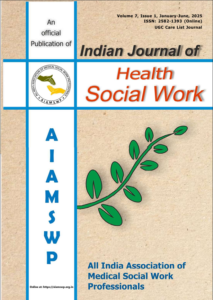Indian Journal of Health Social Work
(UGC Care List Journal)
EXPLORING SOCIAL MEDIA ADDICTION AND IT’S IMPACT ON THE PSYCHOSOMATIC HEALTH OF UNIVERSITY STUDENTS IN WESTERN ODISHA: A GENDER AND BMI PERSPECTIVE
1Research Scholar, School of Statistics, Gangadhar Meher University, Amruta Vihar, Sambalpur 768004, Odisha, India, 2Assistant Professor & Head, School of Statistics, Gangadhar Meher
University, Amruta Vihar, Sambalpur- 768004, Odisha, India.
Correspondence: Deepak Kumar Behera, e-mail : dkbehera4@gmail.com
ABSTRACT
Background: The prevalent issue of university students excessively utilizing social networking
sites (SNSs) has raised significant apprehension due to its potential for cyber addiction and
detrimental impact on psychosomatic health. Aim: The objective of this study was to explore the
potential associations between addiction to SNSs, gender, body mass index (BMI), and health
problems (HPs) in university students from Western Odisha. Methods and Materials: A survey
consisting of a questionnaire was administered to a sample of 300 individuals, comprising
149(49.6%) males and 151 (50.33%) females enrolled in GM University and Sambalpur University
Institute of Information Technology respectively. The gathered data underwent analysis and
interpretation utilizing Microsoft Excel and SPSS 26.00. Results: Significant positive correlation
between SNS addiction and BMI status. Gender differences in BMI status (x
2= 24.626, p<0.01),
number of accounts (x
2= 34.048, p<0.01), and HP score (x
2= 49.984, p<0.01). No significant difference between gender and SNS addiction (x 2= 1.031, p>0.05) or academic performance
(x
2= 11.881, p<0.05). Males had higher BMI status (mean rank= 169.04) than females (mean
rank= 132.21) (H= 17.593, p<0.01). Females had higher HP score (mean rank= 161.37) than
males (mean rank= 139.49) (H= 4.813, p<0.05). Males had more SNS accounts (mean rank=
167.57) than females (mean rank= 133.65) (H= 11.825, p<0.01). No significant difference in SNS addiction between males (mean rank= 146.31) and females (mean rank= 154.64) (H= 1.031, p>0.05). Conclusion: Excessive SNS addiction correlated with higher BMI in university students.
Gender influenced BMI, number of SNS accounts, and HP score. Preventive measures are essential to address the detrimental impact on students’ well-being. The study highlights the adverse
repercussions of SNS addiction on university students’ health in Western Odisha. Insights can
aid healthcare practitioners, educators, and policymakers in formulating preventive measures.
Keywords: Social Networking Sites (SNSs), Cyber Addiction (CA), Body Mass Index (BMI), Psychosomatic Health (PH).
Keywords: Social Networking Sites (SNSs), Cyber Addiction (CA), Body Mass Index (BMI), Psychosomatic Health (PH).

ISSN: 2582-1393 (online)
UGC Care List Journal

